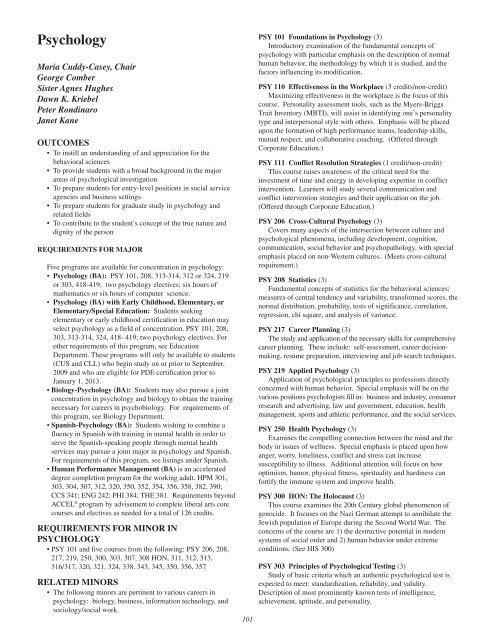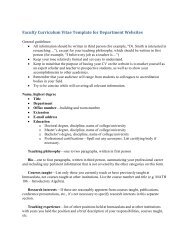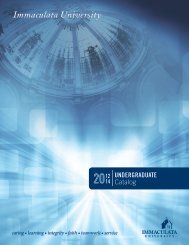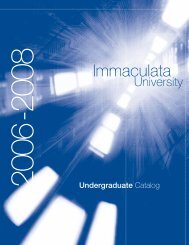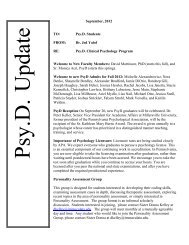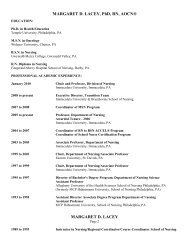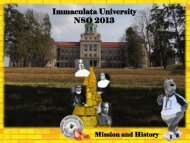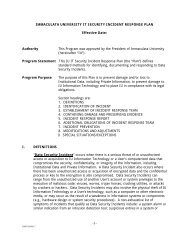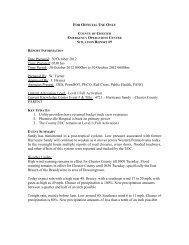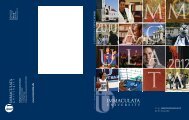Undergraduate Catalog 2008-2010 - Immaculata University
Undergraduate Catalog 2008-2010 - Immaculata University
Undergraduate Catalog 2008-2010 - Immaculata University
You also want an ePaper? Increase the reach of your titles
YUMPU automatically turns print PDFs into web optimized ePapers that Google loves.
Psychology<br />
Maria Cuddy-Casey, Chair<br />
George Comber<br />
Sister Agnes Hughes<br />
Dawn K. Kriebel<br />
Peter Rondinaro<br />
Janet Kane<br />
OUTCOMES<br />
• To instill an understanding of and appreciation for the<br />
behavioral sciences<br />
• To provide students with a broad background in the major<br />
areas of psychological investigation<br />
• To prepare students for entry-level positions in social service<br />
agencies and business settings<br />
• To prepare students for graduate study in psychology and<br />
related fields<br />
• To contribute to the student’s concept of the true nature and<br />
dignity of the person<br />
REQUIREMENTS FOR MAJOR<br />
Five programs are available for concentration in psychology:<br />
• Psychology (BA): PSY 101, 208, 313-314, 312 or 324, 219<br />
or 303, 418-419; two psychology electives; six hours of<br />
mathematics or six hours of computer science.<br />
• Psychology (BA) with Early Childhood, Elementary, or<br />
Elementary/Special Education: Students seeking<br />
elementary or early childhood certification in education may<br />
select psychology as a field of concentration. PSY 101, 208,<br />
303, 313-314, 324, 418- 419; two psychology electives. For<br />
other requirements of this program, see Education<br />
Department. These programs will only be available to students<br />
(CUS and CLL) who begin study on or prior to September,<br />
2009 and who are eligible for PDE certification prior to<br />
January 1, 2013.<br />
• Biology-Psychology (BA): Students may also pursue a joint<br />
concentration in psychology and biology to obtain the training<br />
necessary for careers in psychobiology. For requirements of<br />
this program, see Biology Department.<br />
• Spanish-Psychology (BA): Students wishing to combine a<br />
fluency in Spanish with training in mental health in order to<br />
serve the Spanish-speaking people through mental health<br />
services may pursue a joint major in psychology and Spanish.<br />
For requirements of this program, see listings under Spanish.<br />
• Human Performance Management (BA) is an accelerated<br />
degree completion program for the working adult. HPM 301,<br />
303, 304, 307, 312, 320, 350, 352, 354, 356, 358, 382, 390;<br />
CCS 341; ENG 242; PHI 384; THE 381. Requirements beyond<br />
ACCEL ® program by advisement to complete liberal arts core<br />
courses and electives as needed for a total of 126 credits.<br />
REQUIREMENTS FOR MINOR IN<br />
PSYCHOLOGY<br />
• PSY 101 and five courses from the following: PSY 206, 208,<br />
217, 219, 250, 300, 303, 307, 308 HON, 311, 312, 313,<br />
316/317, 320, 321, 324, 338, 343, 345, 350, 356, 357<br />
RELATED MINORS<br />
• The following minors are pertinent to various careers in<br />
psychology: biology, business, information technology, and<br />
sociology/social work.<br />
101<br />
PSY 101 Foundations in Psychology (3)<br />
Introductory examination of the fundamental concepts of<br />
psychology with particular emphasis on the description of normal<br />
human behavior, the methodology by which it is studied, and the<br />
factors influencing its modification.<br />
PSY 110 Effectiveness in the Workplace (3 credits/non-credit)<br />
Maximizing effectiveness in the workplace is the focus of this<br />
course. Personality assessment tools, such as the Myers-Briggs<br />
Trait Inventory (MBTI), will assist in identifying one’s personality<br />
type and interpersonal style with others. Emphasis will be placed<br />
upon the formation of high performance teams, leadership skills,<br />
mutual respect, and collaborative coaching. (Offered through<br />
Corporate Education.)<br />
PSY 111 Conflict Resolution Strategies (1 credit/non-credit)<br />
This course raises awareness of the critical need for the<br />
investment of time and energy in developing expertise in conflict<br />
intervention. Learners will study several communication and<br />
conflict intervention strategies and their application on the job.<br />
(Offered through Corporate Education.)<br />
PSY 206 Cross-Cultural Psychology (3)<br />
Covers many aspects of the intersection between culture and<br />
psychological phenomena, including development, cognition,<br />
communication, social behavior and psychopathology, with special<br />
emphasis placed on non-Western cultures. (Meets cross-cultural<br />
requirement.)<br />
PSY 208 Statistics (3)<br />
Fundamental concepts of statistics for the behavioral sciences:<br />
measures of central tendency and variability, transformed scores, the<br />
normal distribution, probability, tests of significance, correlation,<br />
regression, chi square, and analysis of variance.<br />
PSY 217 Career Planning (3)<br />
The study and application of the necessary skills for comprehensive<br />
career planning. These include: self-assessment, career decisionmaking,<br />
resume preparation, interviewing and job search techniques.<br />
PSY 219 Applied Psychology (3)<br />
Application of psychological principles to professions directly<br />
concerned with human behavior. Special emphasis will be on the<br />
various positions psychologists fill in: business and industry, consumer<br />
research and advertising, law and government, education, health<br />
management, sports and athletic performance, and the social services.<br />
PSY 250 Health Psychology (3)<br />
Examines the compelling connection between the mind and the<br />
body in issues of wellness. Special emphasis is placed upon how<br />
anger, worry, loneliness, conflict and stress can increase<br />
susceptibility to illness. Additional attention will focus on how<br />
optimism, humor, physical fitness, spirituality and hardiness can<br />
fortify the immune system and improve health.<br />
PSY 300 HON: The Holocaust (3)<br />
This course examines the 20th Century global phenomenon of<br />
genocide. It focuses on the Nazi German attempt to annihilate the<br />
Jewish population of Europe during the Second World War. The<br />
concerns of the course are 1) the destructive potential in modern<br />
systems of social order and 2) human behavior under extreme<br />
conditions. (See HIS 300)<br />
PSY 303 Principles of Psychological Testing (3)<br />
Study of basic criteria which an authentic psychological test is<br />
expected to meet: standardization, reliability, and validity.<br />
Description of most prominently known tests of intelligence,<br />
achievement, aptitude, and personality.


